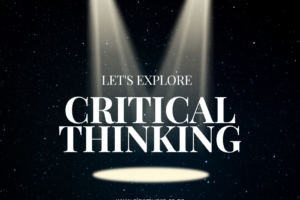What is critical thinking? When we hear the phrase ‘critical thinking’ we tend to assume…

Widening the lens series – Part 2 The stories that we weave
During this series of blogs we look at our everyday workplace practice and how we can increase our professional effectiveness.
In this blog I touch on an area of unconscious bias known to us all…our own narrative (stories). We look at how these stories present themselves at work in the everyday decisions that we make. How those actions affect how we perform within our roles, and the impact of this on our professional profiles.
First, Let me share with you a shortened version of a wonderful parable by Dr David Drake PhD in his teachings on Narrative Coaching.
Imagine you are a pilgrim on a long journey, gathering stories as they appear and storing them like gems in your backpack…
The stories in your backpack don’t look like those of other travellers for they have been shaped by your journey, by the way that you’ve used them to define yourself, and by your assumptions about how other people are judging those stories.
One day you come across a fellow traveller who invites you to open your backpack, promising to be gentle with the stories inside. You’re a little reluctant at first but this fellow traveller makes you feel comfortable and safe.
Slowly you pull out a story, holding it tenderly in your hand, watching keenly to see what response it will elicit. Surprisingly your companion holds no judgement in her eyes as she gazes down at your story, she simply asks questions about it with the curiosity of someone hearing that story for the very first time. Before long you find yourself pulling out more stories and your fellow traveller begins to see patterns arising between them.
You begin to notice that In the re-telling of your stories with the comfortable curiosity of the traveller, you begin to see things within your stories that you never saw before.
It’s easy to draw the parallels between this parable and Professional Supervision. I (the Supervisor) represent the curious traveller, you (the Supervisee) the main character re-telling your stories, and the together we share the Supervision process.
Often at work we will draw upon one of our stories and allow it to define our thoughts and our actions – Allow that narrative (story) to inform how we interact with others. Let me give you some simple examples;
- “I hope she doesn’t notice that I’m not good at this”
- “I can’t believe he did that, I knew he didn’t like me”
- “I always have to redo Tony’s work as he never does it correctly (as well as me)” “Sally is always late, she’s hopeless”
Having someone listening with curiosity to your stories (your narrative) for the first time, without judgement allows that story to come alive in a new way. We begin to see patterns emerge.
Within the Supervision conversation we often stumble across a particular narrative that has informed a decision, impacted a relationship and defined an outcome.
It is through this process that we explore the original event, understand what narrative you created (and why) and see how you integrated that narrative into your identity. We begin to understand the behavioural effects and the impact this particular narrative has had, both personally and in the workplace.
Supervision helps support you in constructing a new option on how you frame that experience, what story you tell, who you see yourself to be, and the actions that you take. Creating an opportunity to attain your desired result. Through the rewinding of the story, we are creating a catalyst for change.
Drop me a line if this resonates with you or if you have any comments or questions. Email click HERE.



